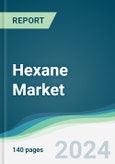Hexane is a clear, colorless, and non-polar solvent that has a slight smell similar to that of petroleum products. It is one of the most common solvents, and its properties make it useful for purposes such as the extraction of vegetable oils from seeds and vegetables, cloths cleaning, furniture, and even shoes, and can also be blended with gasoline in additives. These solvents show a wide array of applications in the lab as they help in preparing and analyzing different chemicals due to their insolubility in water and ability to solvate non-polar compounds like lipids and oils.
Hexane market growth drivers
Increasing Need for Edible Oil
Increasing global demand for edible oil is among the major factors propelling the growth of the hexane market during the forecasted timeline. Hexane acts as an oil extraction solvent from seeds and vegetable sources such as soybean oil, sunflower oil, and canola oil quite effortlessly. It ensures maximum oil yield and is economical to use, especially in large-scale production. The requirement for edible oils is rising owing to the change in food processing patterns and the use of oils for other purposes such as cosmetics, pharmaceuticals, andbiofuels. The USDA statistics reported that by October 2024/2025, the global production of oil seeds statistics showed an increase from 657.85 million metric tonnes in 2023/2024 to 687.32 metric tonnes. This will potentially contribute to increasing the hexane demand worldwide because it is relatively affordable and is used mainly during oil extraction processes.Hexane market geographical outlook
The North American region is expected to witness significant growth in the hexane market.North America is poised to hold a prominent position in the hexane market, particularly due to its growing food processing industry and expansion of the pharmaceutical sector. Governments and businesses throughout the region are looking for ways to reduce carbon dioxide emissions and reliance on oil-based goods and shifting to green solvents is one way to do so. The market for green solvents in this area has benefited from growing environmental concerns and backing from producers of paints and coatings, cosmetics, and other goods.
Moreover, the county's thriving agricultural sector is an important factor in the extraction of edible oil. Food-grade hexane is becoming more necessary as the food service sector grows and consumer preferences change. Furthermore, the existence of numerous end-use industries, including food and beverage, cosmetics, pharmaceuticals, etc., will contribute to the increased hexane consumption in the US. Additionally, hexane is used extensively in the automotive sector in addition to oil extraction. Some of the most valuable automakers in the world are based in the United States. To increase profitability, they have been putting a lot of effort into fortifying their manufacturing bases and creating effective supply chains. For example, in December 2023, the United States produced 10,611,555.000 motor vehicles, a significant rise compared to the previous figure of 10,052,958.000 Units in December 2022.
Reasons for buying this report:
- Insightful Analysis: Gain detailed market insights covering major as well as emerging geographical regions, focusing on customer segments, government policies and socio-economic factors, consumer preferences, industry verticals, other sub-segments.
- Competitive Landscape: Understand the strategic maneuvers employed by key players globally to understand possible market penetration with the correct strategy.
- Market Drivers & Future Trends: Explore the dynamic factors and pivotal market trends and how they will shape up future market developments.
- Actionable Recommendations: Utilize the insights to exercise strategic decision to uncover new business streams and revenues in a dynamic environment.
- Caters to a Wide Audience: Beneficial and cost-effective for startups, research institutions, consultants, SMEs, and large enterprises.
What do businesses use our reports for?
Industry and Market Insights, Opportunity Assessment, Product Demand Forecasting, Market Entry Strategy, Geographical Expansion, Capital Investment Decisions, Regulatory Framework & Implications, New Product Development, Competitive IntelligenceReport Coverage:
- Historical data & forecasts from 2022 to 2030
- Growth Opportunities, Challenges, Supply Chain Outlook, Regulatory Framework, Customer Behaviour, and Trend Analysis
- Competitive Positioning, Strategies, and Market Share Analysis
- Revenue Growth and Forecast Assessment of segments and regions including countries
- Company Profiling (Strategies, Products, Financial Information, and Key Developments among others)
The Hexane Market is analyzed into the following segments:
By Grade
- Polymer Grade
- Food Grade
- Others
By Type
- Neohexane
- Isohexane
- N-Hexane
By Application
- Edible oil extractant
- Industrial Solvent
- Cleaning & Degreasing
By Geography
- North America
- South America
- Europe
- Middle East and Africa
- Asia-Pacific
Table of Contents
Companies Mentioned
- Sigma Aldrich (Merck)
- Royal Dutch Shell PLC
- Exxon Mobil Corporation
- Sumitomo Chemical Co. Ltd
- Bharat Petroleum Corporation Limited
- Hydrite Chemical
- Noah Chemicals
- Tokyo Chemical Industry
- Chevron Phillips Chemical Company LLC
Table Information
| Report Attribute | Details |
|---|---|
| No. of Pages | 140 |
| Published | December 2024 |
| Forecast Period | 2025 - 2030 |
| Estimated Market Value ( USD | $ 2.39 Billion |
| Forecasted Market Value ( USD | $ 2.9 Billion |
| Compound Annual Growth Rate | 3.9% |
| Regions Covered | Global |
| No. of Companies Mentioned | 9 |









